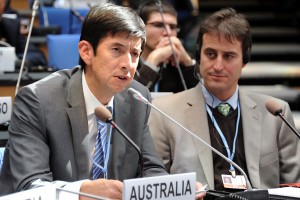 Will universal participation be achieved at the expense of the climate in 2015?
Will universal participation be achieved at the expense of the climate in 2015?
Guess post by Luke Kemp, PhD scholar with Australian National University
A recent trend in politics and academia has been to look at the next global climate agreement in terms of three aspects: ambition, compliance and participation. But all is not well with this holy trinity. Tensions exist, particularly between participation on the one hand and, ambition and compliance on the other.
New Zealand observed this tension on the opening day of ADP negotiations. They then quickly declared that participation was of “first and foremost” importance for the 2015 agreement. Indeed, it now appears to be unquestionable wisdom amongst parties that the heart of the next agreement is complete participation.
Universal participation, flexibility and respect for national circumstances and capabilities are fast becoming the commandments of the international negotiators bible. They are some of the few principles (albeit ambiguous ones) that parties tend to agree on. They are also the key design priorities for the Umbrella Group.
The Umbrella Group of industrialised non-EU countries has traditionally been one of the ‘spoilers’ of climate negotiations. They have also been the best in shaping much of the international discourse and outcomes. The ADP has been no exception. The Durban platform is based upon an agreement that is ‘applicable to all parties’- something which they are fond of mentioning. If we want to get into semantics and a legal analysis (which I would personally love to do) then ‘applicable’ does not mean the involvement of all parties. It just means that all parties are capable of joining if they so wish to.
Applicability has quickly become conflated with participation and that’s just the way the Umbrella Group likes it. Their primary goal is ensuring that any future agreement has the right aspects to allow Umbrella Group parties to join. This is clear from their submissions and engagement with the ADP thus far.
A few ideas tend to repetitively pop up throughout the submissions of Umbrella Group members. Norway emphasises the importance of guaranteeing “broad participation” through flexible arrangements. The US has renewed calls for its much loved ‘pledge and review’ system by declaring that parties choosing their own ‘nationally appropriate’ targets will actually increase ambition. Similarly, Australia has put forward the idea of ‘national schedules’ where countries can inscribe their own targets along with timelines and policies for meeting them.
The insistence upon participation, self-prescribed targets and flexibility are the clear hallmarks of a ‘bottom-up’ model.
 From the Australian perspective this insistence upon a bottom-up approach is logical. It keeps us close to our big brother in international relations – the US – and fits our own unique domestic circumstances.
From the Australian perspective this insistence upon a bottom-up approach is logical. It keeps us close to our big brother in international relations – the US – and fits our own unique domestic circumstances.
Australia will have a national election later this year in September, one which the conservative Liberal party is expected to win in a landslide. Tony Abbott, leader of the Liberal Party, has promised a ‘blood oath’ to repeal the centrepiece of Australian climate policy –the carbon tax- and axe our Department of Climate Change (which just so happens to contain our negotiating team). Even if he fails to roll back the carbon tax, Australia will not be looking to increase its national emission targets anytime soon. The man who once described climate change as “absolute crap” is also unlikely to be open to ratifying a progressive global climate agreement if he becomes the next Australian prime minister.
Other members of the Umbrella Group find themselves in similar positions. The political atmosphere of Canada is almost as toxic as its tar sands. The ruling conservative party has even made Canada the one country to regress in climate policy by withdrawing from the Kyoto Protocol. The US already has major institutional hurdles in ratifying any international treaty that doesn’t involve trading things or blowing them up. On top of that they have an overly oppositional political system which can’t even agree to background checks on gun buyers, let alone a global climate deal.
The common thread amongst much of the Umbrella Group is quite simple. Domestic constraints are severely constraining what they can agree to internationally. So, they want their national realities to shape the next global agreement. From the Umbrella perspective- national concerns should trump and shape the global regime, not vice versa.
But we should be vigilant that participation usually comes with a cost. The history of international governance does not have many success stories. Those which have succeeded, such as the Montreal Protocol or the World Trade Organisation, have been built upon a strong compliance regime, financial commitments and, funnily enough, incremental membership. These are unlikely to occur with a universal bottom-up agreement.
Designing an instrument with universal participation along with effective compliance and ambition is a momentous task. It will likely require some kind of very creative and well thought-out ‘hybrid’ agreement. It will also need open and honest diplomacy. Both of these things are lacking in this process and such a level of discussion is sorely missing in current ADP discussions. Much of the panel sessions have instead become an excuse for panellists to restate party positions.
Searching to appease and include the Umbrella Group will likely lead to a lowest-common-denominator outcome. It happened with Kyoto when the protocol was watered down to accommodate the US who could then not ratify it.
If we are not careful then history may repeat itself. We need to be aware that getting everyone on board may very well sink our global agreement.
Picture credit: Leila Mead, iisd




-
http://tcktcktck.org/2013/05/daily-tck-501-day-3-of-the-un-climate-talks-in-bonn/51591 Daily Tck 5/01: Day 3 of the UN Climate Talks in Bonn » TckTckTck | The Global Call for Climate Action
About the author
Luke Kemp
International advocate for future generations and PhD student from Australia researching international environmental politics





